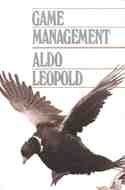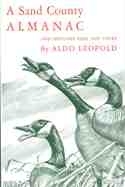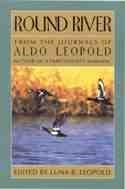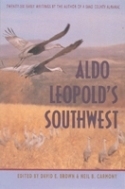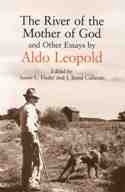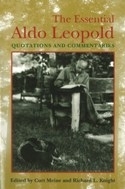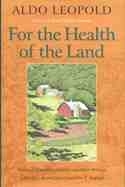Aldo Leopold (Publications)
This article is part of the Aldo Leopold Collection
Contents
Introduction
Aldo Leopold (Aldo Leopold (Publications)) is best known for his posthumously-published work A Sand County Almanac. Leopold received word that his essay collection would be published just a week before his death, at the age of 61. Leopold’s legacy also includes Game Management, the seminal textbook in the development of the discipline of wildlife ecology and management, more than 500 published essays, articles, and reports, and an extensive archival collection of early drafts, unpublished manuscripts, journals, photographs, and correspondence.
Leopold’s life, work, and impact has drawn widespread public interest and intensive scholarly exploration, resulting in a number of major biographical works. Several anthologies provide readers with a survey of Leopold’s extensive and influential writings.
The following are short descriptions of Aldo Leopold’s major works. This collection also features a complete bibliography of his writings.
Major Works
Report on a Game Survey of the North Central States
Leopold, Aldo. 1931. Report on a Game Survey of the North Central States. Sporting Arms and Ammunitions Manufacturers’ Institute, Madison. Out of print.
Leopold’s first book-length work was the fruit of many months of fieldwork undertaken in 1928-29. The work was groundbreaking in its synthesis of facts about game and habitat and established Leopold as “the most informed game expert in the nation,” according to biographer Curt Meine. Leopold's studies covered the Midwestern states of Minnesota, Iowa, Missouri, Illinois, Indiana, Michigan, and Wisconsin, supported with funding by the Sporting Arms and Ammunition Manufacturers' Institute (SAAMI). Working in a landscape that was in many ways defined by private land use, Leopold’s recommendations regarding habitat management as well as policy included a strong focus on farmers. While drafting the report, Leopold was simultaneously leading a 14-member committee on an “American Game Policy,” presented for the Seventeenth American Game Conference in December 1930. “For the first time, a coherent national strategy directed the previously disparate activities of sportsmen, administrators, researchers, and (its framers hoped) landowners,” writes Meine. The policy guided wildlife professionals for over 40 years, until a revised policy was adopted in 1973.
Game Management
Leopold, Aldo. 1933. Game Management. Charles Scribner's Sons. Reprinted in 1986 by University of Wisconsin Press, Madison. ISBN: 0299107744
Published in 1933, Game Management remained the standard textbook for decades as the academic discipline evolved from game management to wildlife ecology and management. Over a half-century later, the text remains relevant at a technical level and also for providing a look at Leopold’s philosophy at the time of publication. Leopold biographer Curt Meine notes, “Game Management captured Leopold in a state of transition. It was his crowning work as a pioneer in game management, as well as his fullest indication yet that he was seeing far beyond the utilitarian conservation philosophy.”[1]
A Sand County Almanac
Leopold, Aldo. 1949. A Sand County Almanac and Sketches Here and There. Oxford University Press, New York. ISBN: 019505928X
Leopold’s most popular work has sold over two million copies and has been translated into 10 languages. A Sand County Almanac is standard reading for people exploring the relationship between people and the land, and has been cited by leaders in education, sustainable agriculture, and green building as well as forestry, wildlife ecology, and wilderness preservation. Published posthumously, the final version was edited by a team of family and colleagues led by his son, Luna Leopold.
Round River
Leopold, Luna B., ed., 1953. Round River: From the Journals of Aldo Leopold. Oxford University Press, New York. ISBN: 1559710845
Primarily composed of passages found in Leopold’s journals, Round River provides a glimpse of Leopold’s direct contact with the wild, from New Mexico and Chihuahua to Illinois, Missouri, and Wisconsin. Several of the essays were incorporated into a version of A Sand County Almanac originally issued in 1966 that remains in print today.
Aldo Leopold’s Southwest
Brown, David E. and Carmony, Neil B., eds., 1990. Aldo Leopold's Southwest. (Twenty-six early writings). University of New Mexico Press, Albuquerque. Originally published as Aldo Leopold's Wilderness by Stackpole Books. ISBN: 0826315801
The southwestern United States is where Aldo Leopold began his professional career. Following graduation from the Yale School of Forestry in 1909, he arrived in the Arizona Territory to become a forest assistant on the Apache National Forest, which was established in 1908. Over the next 15 years, he would thrive on challenges presented by forest administration and changes in the landscape that exhibited rapid soil erosion, dwindling game populations, and new roads spreading into the mountains. In the 1930s, he would visit the remote Gavilan River watershed in Mexico’s Sierra Madre—an experience that led him to focus on the theme of land health, influencing his thoughts on many subjects, from the justifications of wilderness preservation to the proper relationships of people to land. The editors of this anthology collect Leopold’s best work relating to the Southwest, providing insights into Leopold’s professional and intellectual growth, as well as the region’s deserts, forests, rivers, mountains, and wild and human inhabitants. The editors provide a brief biography and insightful commentary on each essay.
The River of the Mother of God and Other Essays by Aldo Leopold
Flader, Susan and Callicot, J. Baird, eds, 1991. The River of the Mother of God and Other Essays by Aldo Leopold. University of Wisconsin Press, Madison. ISBN: 0299127648
The most comprehensive of the Leopold anthologies, this collection includes some 50 reports, addresses, and essays, providing a glimpse of Aldo Leopold’s thinking as a student at an eastern prep school to the pinnacle of his career as an ecologist and conservationist. In their introduction to the collection, the editors place Leopold's writing in biographical and historical context and provide insightful analysis of Leopold’s writing and his key themes. The anthology also includes a timeline and a definitive bibliography. The editors suggest, “Perhaps the greatest value of these essays is the insight they afford into the development of Leopold’s thought on a variety of topics, including natural esthetics, environmental ethics, conservation economics, agriculture, and wilderness, all driven by his evolving systemic worldview which matured apace with the science of ecology.”[2]
The Essential Aldo Leopold
Meine, Curt and Knight, Richard L., eds. 1999. The Essential Aldo Leopold. University of Wisconsin Press, Madison. ISBN: 029916554X
Those seeking quick evidence of the breadth of Leopold’s expertise and subjects of his writing can find it in The Essential Aldo Leopold. This collection catalogues thousands of short passages from Leopold’s writing in 21 chapters and three sections: conservation science and practice, conservation policy, and conservation and culture. The editors provide a brief introduction to each section, and a chorus of diverse conservation voices provide introductions to each chapter. Together, these commentaries demonstrate Leopold’s profound influence on the physical and cultural landscape we encounter today. “…I can honestly say it is Aldo Leopold’s voice I continue to hear whenever I put pen to paper in the name of wildness,” writes Utah’s Terry Tempest Williams in the introduction to Chapter 7, Wilderness. Other contributing essay writers are Susan Flader, Jack Ward Thomas, Richard Knight, Stanley Temple, Paul W. Johnson, Wes Jackson, Joy Zedler, Gary Meffe, Eric Freyfogle, Charles Wilkinson, Edwin Pister, Donald Snow, Bryan Norton, Richard Nelson, Donald Worster, David Orr, Gary Paul Nabhan, Joni Kinsey, J. Baird Callicott, and Curt Meine.
For the Health of the Land
Callicott, J. Baird and Freyfogle, Eric T. , eds., 1999. Aldo Leopold: For the Health of the Land. (previously unpublished essays and other writings). Island Press/Shearwater Books, Washington DC. ISBN: 1559637641
For the Health of the Land includes essays written following Leopold’s return to the Midwest and focus on his concern for promoting conservation on private lands. This volume includes many of the essays about conserving farm wildlife that Leopold wrote for a general audience of land owners and farmers as part of his outreach work at the University of Wisconsin, and which he later reworked for A Sand County Almanac. The third part of the book is devoted to Leopold’s concept of land health, including the essay “The Land Health Concept and Conservation,” published here for the first time. In these essays, the editors note, “…one finds not only how-to advice on promoting game-bird populations, managing small woodlots, and fostering roadside prairies but also penetrating comments on nature—how its many parts fit together and how people are ultimately dependent on it and must work actively to conserve it.”[3]
References
